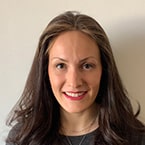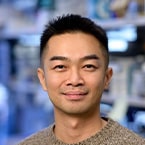AACR-D-Team Sarcoma Research Fellowship
The AACR-D-Team Sarcoma Research Fellowship represents a joint effort to encourage and support a postdoctoral or clinical research fellow to conduct translational or clinical sarcoma research and to establish a successful career path in this field.
2023 grantees

Research
Ewing sarcoma is the second most common primary malignant bone tumor in adolescents and young adults. Although metastasis was previously believed to be due to the aggressiveness of the tumor, the tumor microenvironment has been shown to share an equally important role. Dr. Offenbacher’s collaborators have discovered a 3-cell assembly consisting of an invasive tumor cell, Tie2-high expressing macrophage and endothelial cell. This 3-cell assembly, called the tumor microenvironment of metastasis (TMEM), serves as a modality by which cancer cells enter the bloodstream. Dr. Offenbacher has successfully demonstrated TMEM doorways in both their laboratory’s clinically relevant mouse model as well as in Ewing sarcoma patient samples. In this project she will evaluate the effect of chemotherapy on TMEM doorways in mice with Ewing sarcoma and then evaluate the effect of Rebastinib, a Tie2 kinase inhibitor, and Nirogecestat, a Notch signaling inhibitor on Ewing sarcoma metastasis.
Biography
Dr. Offenbacher received her medical degree from SUNY Downstate College of Medicine and completed her pediatrics residency at the Children’s Hospital at Montefiore (CHAM). She is currently a pediatric hematology/oncology fellow at CHAM/Albert Einstein College of Medicine where she will continue as an instructor. Her research focuses on the tumor microenvironment in Ewing sarcoma, and on the mechanisms by which chemotherapy may inadvertently increase metastasis, along with therapeutic strategies to deter this chemotherapy-induced metastasis.
Acknowledgement of Support
“The AACR-D-Team Sarcoma Research Fellowship will provide exceptional support and training for me to continue my work developing novel therapeutic strategies in Ewing sarcoma as I continue my path toward becoming an independent translational scientist in the field of pediatric sarcoma.”

Research
Angiosarcomas are rare and aggressive cancers derived from endothelial cells that may arise from any part of the body. Prognosis is poor, with a 5-year survival rate of <30%. In radiation-associated angiosarcoma (RAAS), the MYC gene is amplified and overexpressed. Dr. Wong and his colleagues have generated the first genetically engineered mouse model of angiosarcoma whereMyc overexpression can be turned on specifically in endothelial cells. These mice develop pulmonary angiosarcoma which progresses from low-grade to high-grade to dedifferentiated with loss of endothelial lineage. These data indicate that in mouse pulmonary endothelial cells, Myc overexpression alone can initiate growth and mediate progression and lineage plasticity. He aims to use this mouse model to shed light on MYC-mediated tumorigenesis and plasticity in RAAS.
Biography
Dr. Wong acquired his doctorate in Genetics and Genomics at Boston University School of Medicine. He is currently a research associate in the Human Oncology and Pathogenesis Program at Memorial Sloan Kettering Cancer Center. He is interested in modeling malignant diseases, characterizing aberrantly activated transcriptional factors, and screening for therapeutics to target oncogenic dependence. His long-term career goal is to become an independent scientific investigator in academia in the field of translational cancer research to improve personalized cancer medicine.
Acknowledgment of Support
“I believe this award is an excellent opportunity for me to gain advanced training in technical and soft skills from my mentor and collaborators to ensure a smooth transition to independence. Furthermore, this award will allow me to complete the studies proposed and gather preliminary data for higher-level grant applications.”